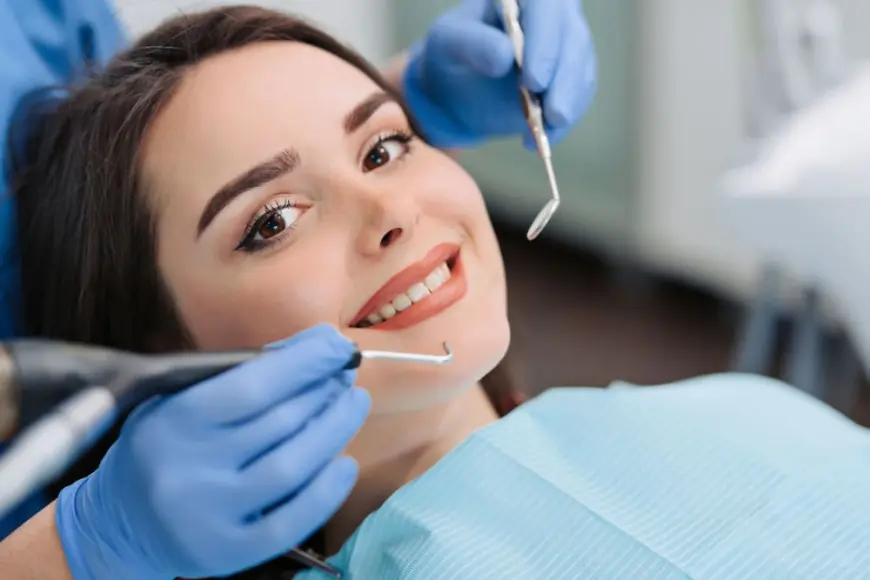How Teeth Cleaning Removes Bacteria
Unlock a radiant smile with our dental experts. Discover an affordable Teeth Cleaning Cost In Dubai & Abu Dhabi. Your path to a healthier and happier smile.

Teeth cleaning is an essential dental procedure aimed at maintaining oral health by removing plaque, tartar, and harmful bacteria. Over time, bacteria build up in the mouth, leading to dental problems like cavities, gum disease, and bad breath. The process of professional teeth cleaning not only helps in improving the aesthetic appearance of your smile but also plays a crucial role in preventing these dental issues. In this article, we will explore how teeth cleaning effectively removes bacteria from the mouth and its importance in maintaining overall oral hygiene.
The Role of Plaque and Bacteria in Oral Health:
Plaque is a soft, sticky film of bacteria that forms on teeth throughout the day. While some bacteria in the mouth are harmless or even beneficial, others can be harmful. These harmful bacteria feed on food particles left on teeth and produce acids that attack tooth enamel. Over time, this can lead to cavities, tooth decay, and gum disease. If plaque is not removed through regular brushing and flossing, it can harden into tartar, which can only be removed by a dental professional. Teeth Cleaning Dubai is designed to remove both plaque and tartar, thus eliminating the harmful bacteria that accumulate in the mouth.
How Professional Teeth Cleaning Removes Bacteria:
During a professional tooth cleaning, the dentist or hygienist uses specialized instruments to carefully clean the teeth and gums. This process removes bacteria and plaque that are often difficult to reach with home brushing alone.
Scaling: Removing Plaque and Tartar:
One of the primary steps in teeth cleaning is scaling. Scaling involves using a hand-held or ultrasonic tool to scrape away plaque and tartar from the surface of the teeth, particularly along the gum line and between the teeth. This is an important step in bacteria removal, as plaque and tartar provide a breeding ground for harmful bacteria. The scaling process ensures that these bacteria are removed from areas that are difficult to access during regular brushing.
Polishing: Smoothing the Teeth:
After scaling, the teeth are polished using a special toothpaste and a high-powered electric toothbrush. This step helps to smooth the surface of the teeth and remove any remaining plaque or stains. A smooth surface is less likely to accumulate bacteria, as it makes it harder for plaque to stick to the teeth. Polishing also helps in eliminating the remaining bacteria that may be stuck on the surface of the teeth.
Flossing: Cleaning Between the Teeth:
Flossing is another critical part of professional teeth cleaning. It helps remove bacteria and food particles trapped between the teeth that regular brushing may miss. By thoroughly cleaning between the teeth, flossing ensures that bacteria are completely removed from all areas of the mouth.
Rinsing: Final Bacteria Removal:
In some cases, the dentist or hygienist may recommend a rinse with an antimicrobial mouthwash after the cleaning procedure. This rinse helps to kill any remaining bacteria in the mouth, ensuring that the mouth is left as clean and bacteria-free as possible.
The Importance of Removing Bacteria from the Mouth:
Removing bacteria through regular teeth cleaning is essential for preventing a range of oral health problems.
Preventing Cavities:
When harmful bacteria are left unchecked in the mouth, they can cause tooth decay, which leads to cavities. By removing plaque and tartar through professional teeth cleaning, the bacteria responsible for this damage are eliminated, reducing the risk of cavities. Teeth cleaning is one of the most effective ways to keep your teeth free from decay-causing bacteria.
Preventing Gum Disease:
Bacteria that accumulate along the gum line can lead to gum disease, which is characterized by inflammation, bleeding, and even tooth loss in severe cases. By removing bacteria from the gums, teeth cleaning helps prevent the onset of gum disease. Regular cleaning is particularly important for individuals at risk of developing gum disease, as it helps to reduce bacterial buildup that can irritate and infect the gums.
Combatting Bad Breath:
Bad breath, or halitosis, is often caused by the presence of bacteria in the mouth. These bacteria break down food particles, producing foul-smelling gases in the process. Teeth cleaning removes these bacteria, improving the freshness of your breath and helping to keep your mouth clean and odor-free.
Improving Overall Health:
While teeth cleaning is primarily aimed at maintaining oral health, it can also have positive effects on overall health. Poor oral hygiene and the bacteria present in the mouth have been linked to various systemic conditions, including heart disease and diabetes. By removing harmful bacteria through regular Teeth Cleaning Cost in Dubai, you may help reduce the risk of developing such conditions.
How Often Should You Have Teeth Cleaning?
The frequency of professional teeth cleaning depends on your oral health and personal needs. Generally, it is recommended to have a professional cleaning at least twice a year. However, individuals with a higher risk of dental problems may need more frequent cleanings. Your dentist can help determine the right cleaning schedule based on your oral health status.
Conclusion:
Teeth cleaning is an essential part of maintaining good oral health. By removing plaque, tartar, and harmful bacteria from the teeth and gums, this procedure helps to prevent dental issues such as cavities, gum disease, and bad breath. Regular teeth cleaning not only ensures a cleaner, healthier mouth but also contributes to overall well-being by reducing the risk of systemic health problems associated with poor oral hygiene. If you haven't had a professional teeth cleaning recently, consider scheduling an appointment to keep your mouth healthy and bacteria-free.
What's Your Reaction?
 Like
0
Like
0
 Dislike
0
Dislike
0
 Love
0
Love
0
 Funny
0
Funny
0
 Angry
0
Angry
0
 Sad
0
Sad
0
 Wow
0
Wow
0






















































